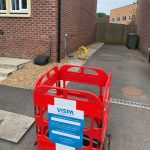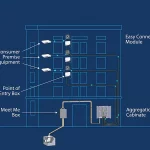Setback After Airband Build Devon Wireless Mast Without Permission UPDATE
Wireless UK ISP Airband, which holds a number of multi-million pound state aid fuelled contracts to deploy “superfast broadband” (30Mbps+) across rural parts of Devon and Somerset, appears to have got itself into trouble with South Hams District Council after they built a 24 metre high mast without permission.
Last year the Connecting Devon and Somerset (CDS) project, which is supported by the government’s Broadband Delivery UK programme, awarded Lot 4 (i.e. coverage the areas of Northern, Central and West Devon) of their Phase 2 contract to Airband as part of a £7m deal to cover 13,000 premises (here). This is on top of an existing £4.6m contract to cover 5,800 premises in the Dartmoor and Exmoor National Parks (here).
Airband tends to build a Line of Sight (LOS) style wireless network, which uses kit that operates in the 5.4-6GHz range and they have a backhaul solution that uses the 17.7-19.7GHz band. The operator has also constructed a number of fairly tall masts in order to help distribute their service, with the signal then being sent toward small antennas that are installed on the outside of local homes.
Advertisement
Unfortunately one of Airband’s masts, which appears to form part of an important backhaul ring around Dartmoor, is now facing removal after South Hams District Council (SHDC) won an appeal after complaining that the 24 metre high lattice mast and ancillary equipment at Goodamoor Farm (PL7 5DG) had been built without the correct planning permission (APP/K1128/C/17/3184427).
The situation appears to have arisen because of a conflict between the Airband deployment and a nearby mine. The mast site sits just outside the perimeter screening bund of Drakelands Mine, which only opened in 2015 and is home to one of the world’s largest deposits of tungsten (the EU and UK both define tungsten as being “critical” to supply). Mines like this have quite a wide perimeter of protection from non-mining developments, which is where the problem arises.
Airband claimed that the telecommunications mast here at issue is an “important piece of local infrastructure, since no fixed broadband services or alternative mobile broadband service are available in this part of the South Hams. There is, then, a strategic need for the mast,” but this appears to have been outweighed by the importance of the mine.
The ISP further argued that it had “chosen this site as the best location” for their mast, although the case documents note that Airband had failed to provide any site-specific information to support that “generic” assertion or to explain why other potential sites were considered less suitable.
Advertisement
Inspector Jessica Graham said:
There is, then, no evidence that the mast could not be sited in an alternative location, where it would still achieve the aim of providing wireless broadband to the locality, but would not lie in such close proximity to the Mineral Safeguarding Area for Drakelands Mine.
In fairness I should note that even if such evidence had been provided, the strategic need for the mast would not automatically be deemed “overriding”: a balance would still need to be struck between the relative strategic importance of the provision of wireless broadband, and mining operations at Drakelands Mine.
However, in the absence of any evidence to demonstrate why a mast must be sited in this specific location, there cannot be any “overriding strategic need” for this particular mast on this particular site. In simple terms, it appears possible that the mast could be effectively relocated: it is evident that the tungsten mine could not.
The development does not therefore satisfy any of the five criteria against which non-mineral development close to a Mineral Safeguarding Area might be permitted by Policy M2 of the Devon Minerals Plan.
The ruling, which was passed down at the end of May 2018, gave the ISP six months to comply and find a suitable alternative location. We have tried several times to contact Airband and CDS over the past few weeks but sadly nobody has responded to help explain how the situation will be resolved.
Meanwhile there also appears to be precious little information available on the take-up and deployment progress of Airband’s new network, although a recent scrutiny committee report in Devon said: “CDS remain confident that the delivery of new fibre and wireless services delivered by Airband and Gigaclear will be completed” by March 2020. The committee also identified some related concerns.
Extract from Devon’s Broadband Task Force Report
Transmitter masts used by Airband also require planning permission, and particularly in the National Parks where planning controls are tighter, this has required a variety of approaches, including working closely with communities and the use of natural materials for masts which blend into the rural environment.
…
The signal strength of fixed wireless broadband can also be diminished, if obstacles such as buildings and trees are located between masts and homes. Such issues should be taken into account in the planning and deployment stages, but problems with actual speeds available have been reported in areas covered by Airband.
In addition, the Task Group has heard reports of Airband ‘splitting’ IP addresses which prevents users from accessing services which require two-way authentication, such as online banking. Airband have responded stating that this approach has been taken in response to the worldwide shortage of IP addresses, and that they can provide single IP addresses (at an additional cost) to customers upon request.
The same report further called on CDS, Airband and Gigaclear to improve how they communicated the progress of their deployments with the public, such as by holding more public events / meetings and issuing a quarterly newsletter via the CDS and ISP website(s) with related details. We’ve yet to see such a detailed newsletter.
“Going forward, CDS must commit to communicating better with communities and businesses, and being as open as possible about the challenges it faces and the decisions it makes, including a full and proper consultation on the spending of gainshare monies,” said the report.
Advertisement
UPDATE 19th July 2018 @ 4pm:
It seems our article finally prompted some activity and we now have a comment from Airband, which also clarifies a separate mast issue in Okehampton that we raised (we didn’t cover this in the article above due to limited information).
Redmond Peel, MD of Airband, told ISPreview.co.uk:
“Around 60 percent of the masts used to create our network infrastructure are ‘permitted development’ – upgrades to existing mast structures, masts up to 15m or other permitted development – and they do not legally require planning permission.
We follow industry best practice by taking advice from an independent telecoms planning specialist. Occasionally local planning may disagree as there is some subjectivity and different authorities interpret issues in different way.
We’re extremely proud of our reputation of working sensitively in rural areas designing an infrastructure that is as non-invasive as possible and we work closely with national park bodies and other stakeholders including the planning inspectorate to make sure that there is minimal environmental impact.
When there is a disagreement we either make an appeal or apply for planning.
The refusal of retrospective planning on this Sparkwell/Ledgate Lane mast is due to its proximity to a blast zone from an adjacent mine. Airband had commissioned an independent study to confirm that the blast zone was not an issue but the planning inspectorate felt in the future it may be. Planning was not sought at an earlier stage due to an administrative error where internal documents indicated it was a replacement mast. This was picked up on an internal audit and the planning authority was contacted and planning was sought retrospectively.
We have now made a made a formal pre-application advice query for a mast on an adjacent site, and as part of this we joined the Council Planning Officer on a visit to the proposed site on June 28. We are currently waiting for a response to this and as soon as we have this, we will be able to move forwards on this in full partnership with the planning department.
Airband customers will continue to enjoy their Superfast service with no disruption, and any legal or planning process is our financial responsibility.
Disagreements over mast sites are rare and out of 470 masts we have erected in projects across the UK we have only had one other site raised as an issue. This is the Sourton mast (Cowsen Lane, Okehampton) which is a previous mast site upgrade and should be resolved shortly. We put retrospective planning in for this mast on June 8, and we have just forwarded confirmation of payment for this to the council, as records of our payment were lost. This application is currently with the planning office and we anticipate it will be resolved very shortly.
Airband’s contract with CDS means that we are 100% responsible for the cost of any legal or planning process created by this. The taxpayer pays nothing.”
Mark is a professional technology writer, IT consultant and computer engineer from Dorset (England), he also founded ISPreview in 1999 and enjoys analysing the latest telecoms and broadband developments. Find me on X (Twitter), Mastodon, Facebook, BlueSky, Threads.net and Linkedin.
« Cityfibre Respond as Chancellor Preps Date for Copper Switch Off UPDATE

















































Comments are closed